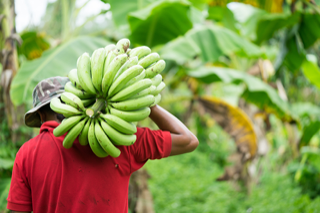
AgBiome Turns to 3Bar Biologics to Bring New Biocontrol Products to Africa

AgBiome’s flagship product, a microbe-based fungicide called Howler, is available throughout the U.S. and is also gaining traction around the world. Research is continuing to produce product candidates and the company now has its sights on bringing some of them to a new market: Africa.
The Research Triangle Park-based company’s platform technology, called Genesis, screens collections of microbes to identify the ones that have potential agricultural applications. Earlier this year, AgBiome announced that the Bill & Melinda Gates Foundation continued its grant support of one particular part of the company’s research, which is focused on developing low-cost microbial pesticides for smallholder farms in sub-Saharan African countries.
AgBiome notes that an estimated 33 million of these small farms account for up to 70% of that region’s food supply. By replacing synthetic pesticides, biological products can help protect the health of farmers while also reducing environmental impacts.

AgBiome’s sub-Saharan Africa research is focusing on developing biological products that farmers can apply to fields growing maize, sorghum, banana, and yam. The company says its scientists have discovered more than 100 strains that have shown potential for controlling fungal diseases and nematodes found in the region.
Partnerships have been key for the commercialization of Howler throughout the world. Such deals are bringing the microbe-based fungicide to Europe, the Middle East, and Asia. Those partnerships are oriented around commercialization, leveraging the regulatory expertise and marketing capabilities of a larger, more established company to bring the product to growers. But in its latest alliance, AgBiome is turning to another startup, 3Bar Biologics, as part of its research. The Colombus, Ohio-based company has developed a delivery system that essentially brings a key part of the laboratory to the farm field.
One important difference between biological inputs and crop chemicals is that a biological input is a living product. These microorganisms need to stay alive from the time they are manufactured to when they are applied to the crop. 3Bar’s technology keeps the microbes inert until they’re needed. The company’s process starts by turning the microbes into a dry powder, which is then used to fill a plastic cap that is aseptically sealed. That cap becomes part of the biocontrol product’s packaging, which has a shelf life of two years. The microbes remain inactive until a grower presses on the cap to introduce them into a chamber in the packaging, which serves as a bioreactor. The microbes multiply inside the packaging, yielding a final product that can be applied to farm fields. 3Bar calls its technology “LiveMicrobe.”
“Partnering with 3Bar’s LiveMicrobe system will allow us the ability to extend shelf-life, decrease application rate and improve the economics overall for the grower, opening up the possibility for markets globally,” Dave Ingham, product development lead of AgBiome said in a prepared statement.
The research will cover non-spore-forming bacterial strains discovered by AgBiome that will be evaluated with 3Bar’s LiveMicrobe technology. According to 3Bar CEO Bruce Caldwell, nearly 80% of what is produced by microbial R&D pipelines is non-spore forming bacteria. These non-spore-forming strains are most beneficial to plants but spore-formers comprise most of what is being commercialized today.
“While our system works with all types of microbes, the industry is due for a major paradigm shift, and we see AgBiome as a perfect partner in this,” Caldwell said.
The amount of money included in the Gates Foundation’s grant was not disclosed, nor were the financial terms of AgBiome’s partnership with 3Bar. However, the Ohio company has reached similar deals with others. In April, 3Bar announced a partnership with Rizobacter Argentina. The subsidiary of Bioceres Argentina is testing a 3Bar biostimulant and the LiveMicrobe system on soybeans in the lab and in field trials around Argentina.
